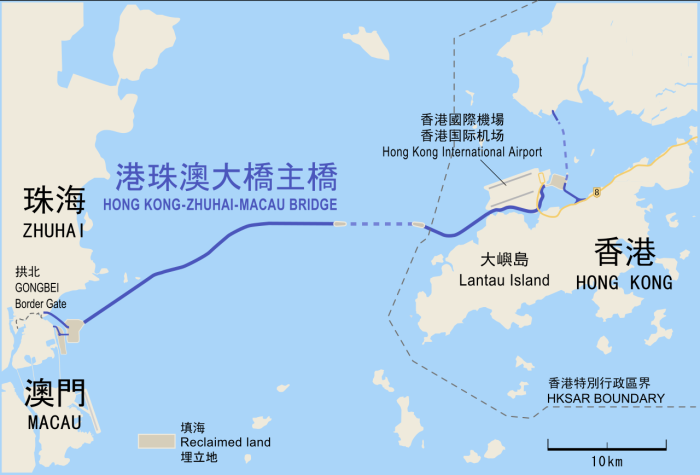



The Hong Kong-Zhuhai-Macao Bridge (HZMB)—comprising viaduct bridges, cable-stayed bridges, a submerged tunnel, and artificial islands—is a 29.6 km (18 mi) link between the regions of Zhuhai, Macao, and Hong Kong. To effectively connect the HZMB to the highway traffic network in Hong Kong, a series of transportation facilities were also implemented in Hong Kong.
The Hong Kong Link Road (HKLR) is one of these transportation facilities. It consists of a dual three-lane expressway and hard shoulder at a total length of approximately 12 km (7 mi). It connects the HZMB at the Hong Kong Special Administration Region boundary to the Hong Kong Boundary Crossing Facilities at the northeast waters of the Hong Kong International Airport island.
The performance specification of the structural health monitoring (SHM) and maintenance management system (MMS) is based on the HKLR reference design. The SHM and MMS maintain the functional requirements of the HKLR reference design for SHM and MMS, but include nine enhancements:
- Direct monitoring (stress and relaxation) of bonded internal post-tensioned (U-shaped vertical) tendons in pier segments
- Direct monitoring (stress and relaxation) of unbonded external post-tensioned tendons in deck segments
- Indirect monitoring (concentration of corrosive gases) of the corrosion status of embedded steel reinforcement in pier segments
- Direct monitoring of visibility and precipitation (instead of only precipitation)
- Accelerometer usage to monitor the effects on the bridge from ship impacts and seismic activity
- Improved accuracy and effectiveness of highway traffic monitoring
- Monitoring of cross-girders at piers
- Enhanced corrosion monitoring of top flanges of selected box girders at pier supports
- Enhanced strain monitoring at mid-spans for deflection derivation
Campbell Scientific’s SHM system monitors the long-term, dynamic status and health of the HZMB as required by the HKLR reference design. The CR6—a multifunctional measurement and control unit—is used as the core data acquisition unit (DAQ). The DAQ is used for the collection and signal condition of corrosion cells, vibrating wire strain gages, vibrating wire load cells, temperature sensors, and 3-D servo-type accelerometers.
In total, the HZMB SHM system uses 46 CR6 units, 90 CR1000 units, and hundreds of expansion peripherals to measure more than 2,700 sensors. This combination of sensors, data acquisition, and data transmission will help decision makers ensure the integrity and longevity of the bridge and provide necessary maintenance.
A significant portion of the SHM data includes structural strain and load cell measurements from more than 1,200 vibrating wire sensors. These sensors are measured by the Campbell Scientific CDM-VW305—or the newer version, VWIRE305. The CDM-VW305 provides dynamic, simultaneous, and noise-free data using patented VSPECT™ technology.